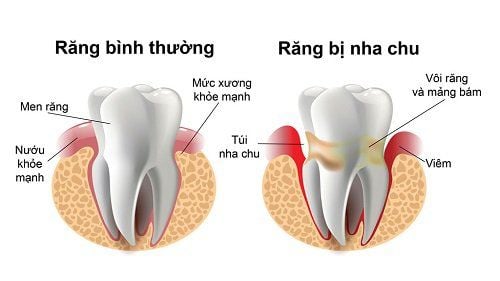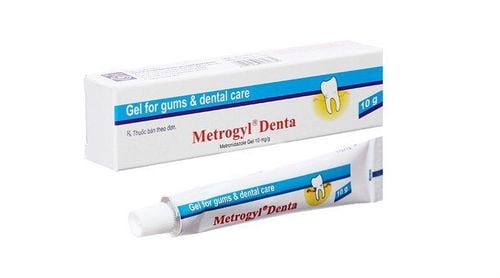Bleeding gums are a sign of gingivitis, periodontitis,... dental diseases caused by improper oral hygiene. In addition, bleeding gums can also indicate that you may have some other dangerous diseases. So what medicine should I take for bleeding gums?
1. Causes of bleeding gums
Bleeding gums are caused by many reasons, the main causes are often due to:
Plaque and bacteria that accumulate over time form tartar, causing bleeding gums.
Incorrect daily oral care will create conditions for bacteria to attack the gums, causing gingivitis and periodontitis.
In addition, crooked teeth, misaligned teeth, and misaligned bites can also cause gingivitis or make the disease worse.
The body's lack of resistance, Vitamin C deficiency, body weakness or hormonal changes, and blood sugar diseases can also lead to bleeding gums.
2. Is bleeding gums a concern?
Gums often bleed when we accidentally touch or bite hard objects. In addition, brushing teeth incorrectly is also the cause of bleeding gums.
If this phenomenon only occurs for a moment and does not continue any time during the day, you do not need to worry. However, if you notice bleeding repeated many times a day or persistent for many days, you need to go to a reputable dental clinic for immediate examination, because this can be a manifestation of some serious oral diseases such as gingivitis, periodontitis, ...
3. What medicine should be taken for bleeding gums?
Medicines for bleeding gums: Medicines for treating bleeding gums and periodontitis that doctors prescribe often include some types such as Amoxicillin, Tetracycline, Metronidazole, Penicillin,... Depending on each person's condition, the doctor will instruct the appropriate dosage.
In addition to taking medicine, when noticing signs of bleeding gums, gingivitis or tooth decay,... Dentists advise us to follow a dental care and hygiene regimen as follows:
Brush your teeth with a soft-bristled toothbrush, gently clean the teeth, especially the innermost teeth with large molars.
Do not continue to use toothpicks, but instead use dental floss to reduce the negative impact on the gums.
Regular dental check-ups to have your dentist check and clean your teeth as well as diagnose and treat possible dental diseases.
You should rinse your mouth with saline or mouthwash to treat gingivitis.
Supplement with Vitamin C to make your gums healthier.
Daily oral hygiene, brush your teeth right after meals with a toothbrush with very soft bristles and brush gently to avoid damaging the gums and causing tooth wear.
Limit foods and drinks with lots of color, too hot or too cold
To arrange an appointment, please call HOTLINE or make your reservation directly HERE. You may also download the MyVinmec app to schedule appointments faster and manage your reservations more conveniently.













